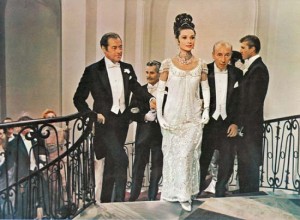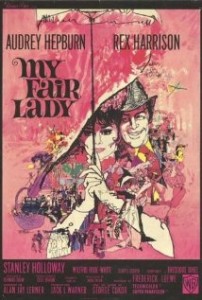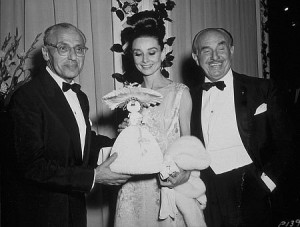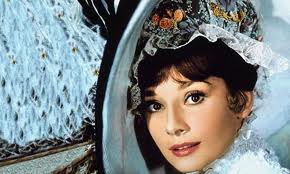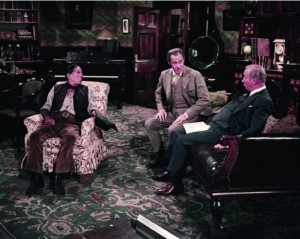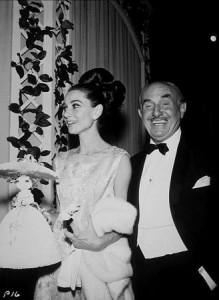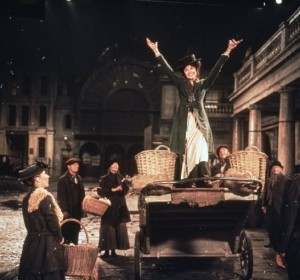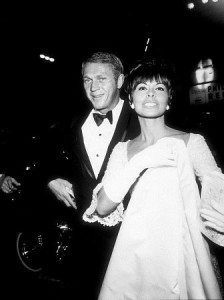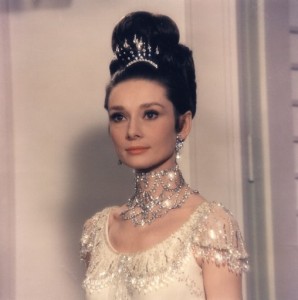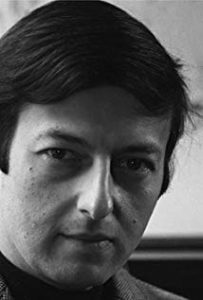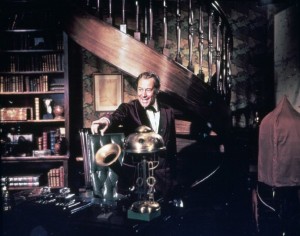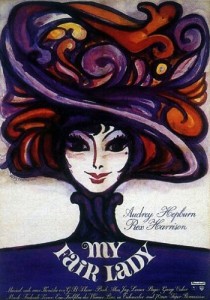My Fair Lady ***** (1964, Rex Harrison, Audrey Hepburn, Stanley Holloway, Mona Washbourne, Gladys Cooper, Wilfrid Hyde White, Jeremy Brett, Theodore Bikel, Isobel Elsom) – Classic Movie Review 127
Re-creating his London and Broadway stage role, Rex Harrison triumphs again on screen in the part he was born for, the imperious, misogynistic Professor Henry Higgins, in this magnificent evergreen musical version of Pygmalion by Frederick Loewe (score) and Alan Jay Lerner (lyrics). It’s a brilliant, effortless-seeming, dominating performance in a timeless classic entertainment.
Reflecting its vast popularity both outside and within the film industry, My Fair Lady swept the board at the 1965 Academy Award ceremony, winning Oscars for best actor (Harrison), film, director (George Cukor), adapted score (musical director André Previn), colour cinematography (Harry J Stradling Sr), colour costume design (Cecil Beaton), colour art direction/ set decoration (Beaton, Gene Allen) and sound (George Groves). And in the UK, it won Best Film at the Baftas.
In the famous story from George Bernard Shaw’s play Pygmalion, the smug and bullying bachelor linguistics professor Higgins bets his colleague Colonel Pickering that he can pass off the cockney flower girl Eliza Doolittle in posh society, but falls for her despite himself and is redeemed by love.
It’s a shame that a semi-miscast Audrey Hepburn, alas elbowing out the perfect star of the stage show Julie Andrews as Eliza Doolittle, has a great deal of difficulty being at all convincing as a common flower girl. Her Cockney accent is nearly as appalling as Dick Van Dyke’s in Mary Poppins. But, after this hiccup, the stylish and elegant Hepburn blossoms effectively and appealingly on her transformation into a lady.
Like Harrison, also re-creating his stage role, Stanley Holloway delights as Eliza’s ne’er-do-well dustman dad Doolittle, especially when he’s singing the rousing ‘With a Little Bit of Luck’ and ‘Get Me to the Church on Time’. Scoring too are Mona Washbourne as the haughty housekeeper Mrs Pearce, Gladys Cooper as Harrison’s snooty mother Mrs Higgins and Wilfrid Hyde White as his sniffy colleague Colonel Pickering.
The show’s timeless songs are superb and richly enjoyable still. It is a huge tribute to them that they really haven’t dated a bit. And George Cukor directs this wonderful entertainment with masterly professionalism and consummate craftsmanship.
Under the eagle eye of executive producer Jack L Warner, Warner Brothers’ vastly expensive studio production looks a divine treat thanks to Cecil Beaton’s delightful costumes, Beaton’s and Gene Allen’s amazing production designs (especially the brilliant, vast, realistic-looking Covent Garden market set) and Harry J Stradling Sr’s eye-catching cinematography. Entirely filmed at Warners’ Burbank Studios, this is one heck of a beautiful, old-style Hollywood production, with all the old, lavish craftsmanship on show.
It is a long show taken at a steady pace and meant for a posh night out at the cinema –contemporary prints of this road show movie had an intermission – and is best seen on as large a screen as possible with a good sound system. Viewers with a small TV set might find it easy to have a short snooze in the talky sections.
Also in the cast are Wilfrid Hyde White, Gladys Cooper, Jeremy Brett, Theodore Bikel, Isobel Elsom, Mona Washbourne, Walter Burke, Henry Daniell, John Alderson, John McLiam, Walter Burke, Queenie Leonard, Owen McGiveney, Jack Raine, Marjorie Bennett, Hilda Plowright, Alan Napier, Moyna MacGill, Jeanne Carson, Oscar Baregi Jr, Betty Blythe, John Holland, Sam Harris, Lillian Kemble- Cooper, Laurie Main, Barbara Morrison, James O’Hara, Richard Peel, Barbara Pepper, Olive Reeves-Smith, Christopher Riordan, Dinah Ann Rogers, Baroness Rothschild, Miriam Schiller, Jacqueline Squire, Michael St Clair, Geoffrey Steele, Grady Sutton, Gwendolyn Watts, Ben Wright, and Ben Wrigley.
It was restored for its 30th anniversary re-release in 1994 by Robert A Harris and James C Katz, the team who restored Lawrence of Arabia (1962), Spartacus (1960) and Vertigo (1958). The digital restoration, which saved the movie from extinction, took six months and cost $600,000.
American singer Marni Nixon dubs Hepburn’s voice on the singing soundtrack, after polishing up a Cockney accent. But Hepburn recorded the songs and in the 1994 restored version her original tolerable trilling singing voice is heard. It is not an improvement, though.
Gossip columnist Hedda Hopper wrote: ‘With Marni Nixon doing the singing, Audrey Hepburn gives only half a performance.’ Jack L Warner replied: ‘I don’t know what all the fuss is about. We’ve been doing it for years. We even dubbed the barking of Rin Tin Tin.’
Jeremy Brett admitted in 1994 that all his singing as Freddy Eynsford-Hill is dubbed by Bill Shirley.
As the ambassador, Henry Daniell appears in his last film. He died of a heart attack on 31 October 1963 a few hours after completing the dress ball sequences. Alan Napier took over his later scenes.
Lerner provides the screenplay. Hermes Pan is the choreographer.
My Fair Lady is one of 11 American musicals to win Best Picture: 1) The Broadway Melody (1929), 2) The Great Ziegfeld (1936), 3) Going My Way (1944), 4) An American in Paris (1951), 5) Gigi (1958), 6) West Side Story (1961), 7) My Fair Lady, 8) The Sound of Music (1965), 9) Oliver! (1968), 10) Amadeus (1984), and 11) Chicago (2002).
At $17 million, it was the most expensive Warner Bros movie at the time.
It was Warner Bros’ first Best Picture Oscar winner since Casablanca (1942) and it was 25 years before it had another with Driving Miss Daisy (1989).
Jack L Warner was ready to ditch Rex along with Julie for My Fair Lady after asking both of them to screen test, which they refused. Julie never heard another word, but Warner got back to Rex when his first choice Peter O’Toole asked for $400,000 and he could get Rex for $200,000. Later Rex was furious to find out Audrey was getting $1,000,000.
Warner had also thought Rex too old after seeing him in Cleopatra, but Rex wrote that as Caesar he was playing an epileptic at the end of his life, and sent him glamorous publicity photographs of himself looking young and lovely.
Julie was also dumped by Warner, along with Burton, for his movie of their stage hit Camelot. But the movie tanked and Warner Bros ousted old Jack as its President.
RIP André Previn, who died on 28 aged 89. He was nominated for 11 Academy Awards, winning four for Best Adapted Score: Gigi (1958), Porgy and Bess (1959), Irma La Douce (1963), and My Fair Lady (1964).
© Derek Winnert 2013 Classic Movie Review derekwinnert.com

